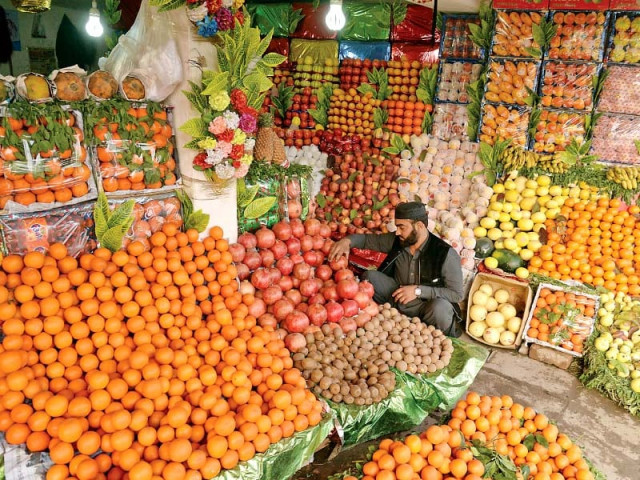Torkham border controls drive fruit vendors to the edge
To plug the gap, traders introduce Turkish, Chinese and Iranian varieties

A fruit shop vendor in the Sikander town area of Peshawar. PHOTO: MUHAMMAD IQBAL / EXPRESS
To fill in the huge gap left by the unavailability of delicious Afghan fruits, Turkish, Chinese and Iranian varieties are now abundantly available in the market.
Trade between the two countries has thinned after Pakistan tightened its border management system to secure the Durand Line over a year ago.
Afghan Trade Commissioner in Peshawar Mirwais Yousufzai says trade between the two countries has scaled down from $2.5 billion per annum to $1.3 billion per annum in the past two years.
Fruit vendors complain about their low profit margin in Iranian, Chinese and Turkish fruits but they are happy with the response they draw. The life of the fruits is longer in comparison to the apples from Kabul and Kandahar’s pomegranate.
“Turkish and Iranian fruits cannot compete with Afghanistan’s fruits in taste. We would sell Kandahar’s pomegranate at Rs250 per kg and our profit was good as compared to the Turkish pomegranate which we sell at Rs300 per kg,” a fruit vendor Noor Rehman said. Their business is on the decline for more than a year because of the cross border tension, according to Rehman.
Another vendor stresses that though the Afghan fruits are better in taste they can hardly do anything because the roads are closed.
“Kabul apples have disappeared from the market and we have to place the Iranian apple in front of our consumers, because we can’t let them go empty-handed,” said Zahir Khan, a fruit vendor who has been associated with the business for 30 years.
Similarly, Pakistani fruits and vegetable are losing their market in Afghanistan because of the cross border tension and the complete closure of the Torkham border.
“Traders have lost billions of rupees in the current crisis situation and the border closure,” a broker in the Peshawar market, Wazir Akram Shinwari, told The Express Tribune.
Shinwari had sent a truck carrying 600 cartons of kinnow to Afghanistan only to return from Landi Kotal as the Torkham border was closed by the security forces.
“The truck cost Rs700,000 when it was sent for Afghanistan but now it will hardly make Rs250,000 in Peshawar because a majority of the cartons have already been damaged.”
Wazir and his partners would be sending the returned fruits to Kurram Agency fruit market where they hope to sell the remaining.
“It was the peak season for oranges, guavas, bananas and kinnow and the border is closed causing loss of billions of rupees loss to the traders,” said Mohammad Khanan, another broker who supplies fruit and vegetables to Afghanistan.
“Except for carrots, cauliflower and turnip, all vegetables are exported to Afghanistan. Pakistani fruits and vegetables are also losing their market in Afghanistan due to the border closure as Afghanistan is opting to find supplies from India, Iran and other central Asian countries.”
The vegetables rates have also seen a nosedive in the local market and the farmers are suffering setbacks, he added.
All Pakistan Agricultural Produce Traders Federation (APAPTF) president Malik Sohni Khan said that 90 per cent trade of Pakistani businessmen have been affected by the current tension as Islamabad was a major exporter to Kabul.
“The gates should be opened at least for a few days to let the stranded trucks reach their destinations,” he said.
According to Mirwais, more than 160 trucks laden with fruits and vegetables cross the border from both the sides on a daily basis.
“Traders and businessmen are suffering because of a political decision which is more of an emotional decision,” he said, urging the leadership of both the countries to find another solution to the problem.
Published in The Express Tribune, March 19th, 2017.



















COMMENTS
Comments are moderated and generally will be posted if they are on-topic and not abusive.
For more information, please see our Comments FAQ